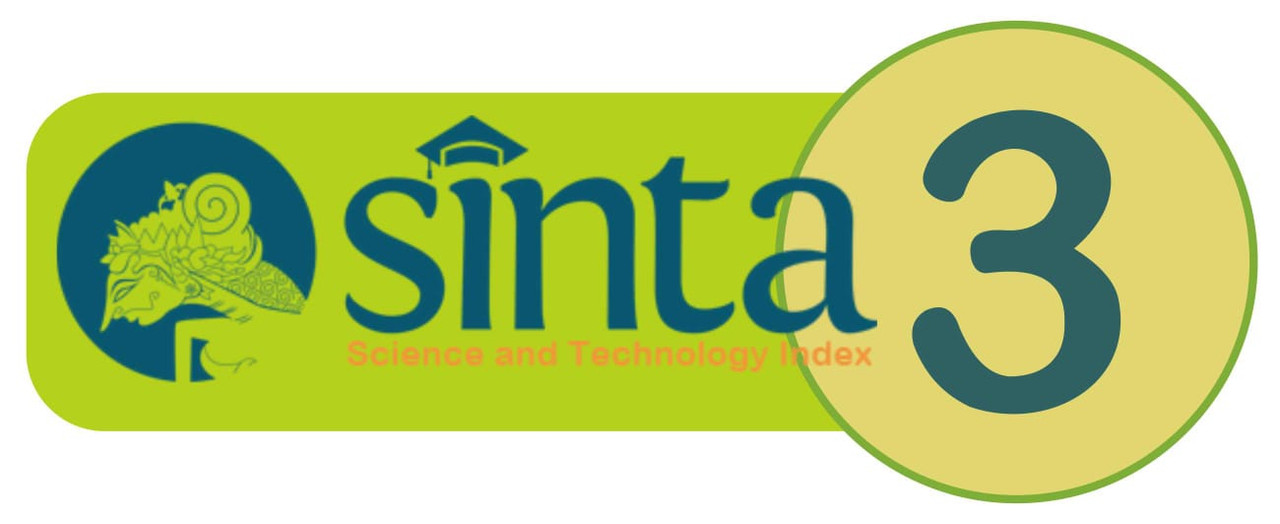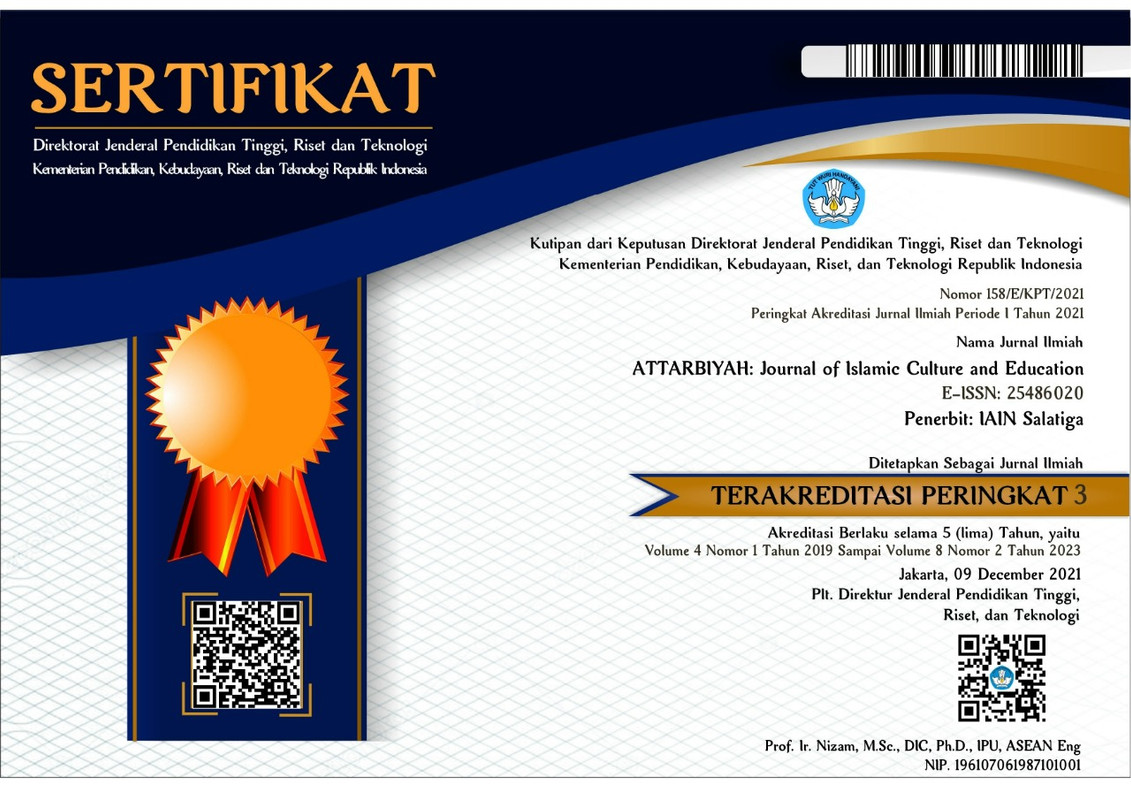Managing diversity: reasoning ibn Khaldun's thought in line with the need to build multicultural education
DOI:
https://doi.org/10.18326/attarbiyah.v10i1.85-101Keywords:
managing religiosity, ibn Khaldun's thought, multicultural educationAbstract
This research examines the relevance of Ibn Khaldun's thoughts in contemporary multicultural education, particularly in building an inclusive and harmonious multicultural education system. This research argues that the social concepts proposed by Ibn Khaldun, such as ashabiyyah (social solidarity), are fundamental in managing diversity in education. By understanding diversity as a source of strength, education must be able to form social habits that strengthen relationships between different groups and build social solidarity. The method used in this research is a qualitative approach with a literature study type. Research findings show that although multicultural education offers opportunities to shape more inclusive and tolerant individuals, the reality on the ground often presents significant challenges. Diversity in education still causes tensions between different groups, whether religious, ethnic, or social. This study found that applying the principle of ashabiyyah, which emphasizes social solidarity, and using an educational approach based on compassion and gradual repetition of concepts can help overcome these challenges. Additionally, teaching methods emphasizing developing social and emotional skills, such as effective communication and empathy, are highly relevant for creating individuals ready to live harmoniously in a diverse society.
References
Abdullahi, A. A., & Salawu, B. (2012). Ibn Khaldun: A Forgotten Sociologist? South African Review of Sociology, 43(3), 24–40. https://doi.org/10.1080/21528586.2012.727543.
Aberson, C. L. (2010). Diversity Experiences and Intergroup Attitudes. 171–189. https://doi.org/10.1002/9781444325447.ch8.
Acep, V. D. A., Acep, Murtini, E., & Santoso, G. (2023). Menghargai Perbedaan: Membangun Masyarakat Multikultural. Jupetra: Jurnal Pendidikan Transformatif, 2(2), 425–432. https://doi.org/10.9000/jpt.v2i2.295.
Alatas, S. F. (2007). The Historical Sociology of Muslim Societies. International Sociology, 22(3), 267–288. https://doi.org/10.1177/0268580907076570.
Alatas, S. H. (2014). Applying Ibn Khaldun: The Recovery of a Lost Tradition in Sociology. Routledge.
Alwagdani, A. (2020). Ibn Khaldun on Discipline. Journal of Advanced Research in Social Sciences and Humanities, 5(4). https://doi.org/10.26500/jarssh-05-2020-0403.
Ardıç, N. (2017). Khaldunian Studies Today: The Contributions of Syed Farid Alatas. Journal of Historical Sociology, 30(1), 77–85. https://doi.org/10.1111/johs.12156.
Bagley, C. (2001). Multicultural Education and Social Cohesion in a Global Era. International Journal of Educational Development, 21(1), 55–66.
Moh. B. A., & Taufiq, M. A. (2023). Implications of Islamic Education Perspective of Ibnu Khaldun in Elementary Schools. Journal Al-Mudarris, 6(2), 110–121. https://doi.org/10.32478/al-mudarris.v6i2.1636.
Banks, J. A. (2019). An introduction to multicultural education (Sixth edition). Pearson.
Booth, A., Sutton, A., & Papaioannou, D. (2016). Systematic approaches to a successful literature review (Second edition). Sage.
Castelino, L. M., & Shinde, R. (2023). A Review on Evolution and Importance of Diversity Education and Inclusion in Building an Effective Organizational Culture. International Journal of Case Studies in Business It and Education, 62–89. https://doi.org/10.47992/ijcsbe.2581.6942.0288.
Dajani, B. A. S. (2015). The Ideal Education in Ibn Khaldun's Muqaddimah. Procedia - Social and Behavioral Sciences, 192, 308–312. https://doi.org/10.1016/j.sbspro.2015.06.044.
Damayanti, W., Sari, N. D., Amrullah, A., & Fakhruddin, F. (2024). Konsep Pendidikan Islam Religius Pragmatis Ibnu Khaldun dan Relevansinya pada Pendidikan Islam di Era Modern. Indonesian Journal of Innovation Multidisipliner Research, 2(3), 30–40. https://doi.org/10.31004/ijim.v2i3.88.
Enan, M. A. (2013). Biografi Ibnu Khaldun. Zaman.
Farabi, M. A. (2023). Ibn Khaldun's Considerations Relating to Islamic Education and Their Perspective on the Future. Ta Dib Jurnal Pendidikan Islam, 11(2), 205–214. https://doi.org/10.29313/tjpi.v11i2.10531.
Gong, S. (2017). The Trend of Tourism Service Integration and Promotion From the Perspective of Multiculturalism. Destech Transactions on Social Science Education and Human Science, ssme. https://doi.org/10.12783/dtssehs/ssme2017/12922.
Halafoff, A., Singleton, A., Bouma, G. D., & Rasmussen, M. L. (2019). Religious Literacy of Australia's Gen Z Teens: Diversity and Social Inclusion. Journal of Beliefs and Values, 41(2), 195–213. https://doi.org/10.1080/13617672.2019.1698862.
Hamzah, S., & Nisa, A. K. (2024). Metode Sejarah dalam Perspektif Ibnu Khaldun (Telaah Kitab Mukaddimah). CARITA: Jurnal Sejarah dan Budaya, 2(1), 33–43. https://doi.org/10.35905/carita.v2i1.5301.
Han, J. (2024). An Evaluation of the Importance of Teacher Diversity in the Teacher Recruitment Process. Lecture Notes in Education Psychology and Public Media, 36(1), 110–114. https://doi.org/10.54254/2753-7048/36/20240434.
Hartinah, H., Riantika, T. P., & Safira, N. (2023). Enhancing Tolerance and Cultural Diversity Through Multicultural Education Management. Jurnal Islam Nusantara, 7(1), 97. https://doi.org/10.33852/jurnalnu.v7i1.450.
Hubbard‐Jackson, C. (2021). Navigating the Impact of the Community on Community College Diversity, Equity, and Inclusion. New Directions for Institutional Research, 2021(189–192), 109–119. https://doi.org/10.1002/ir.20355.
Ibn Khaldūn. (2015). The Muqaddimah: An introduction to history (First Princeton Classics edition). Princeton University Press.
Ilham, M. (2016). Konsep 'Ashabiyah dalam Pemikiran Politik Ibnu Khaldun. Jurnal Politik Profetik, 04(1), 4–11 https://doi.org/10.24252/profetik.v4i1a1 .
Islam, S., & Hossain, A. (2017). Understanding the Society and Governance of Bangladesh Through the Lens of Ibn Khaldun. Open Journal of Social Sciences, 05(04), 194–215. https://doi.org/10.4236/jss.2017.54018.
Juraev, Z., Rasulov, I., & Soliev, K. (2023). Review: Ibn Khaldun's “Muqaddimah” and Its Significance for Migration Issues. World Journal of Advanced Research and Reviews, 18(2),1111–1119. https://doi.org/10.30574/wjarr.2023.18.2.0964.
Knoblauch, C. (2024). Experiencing Religious Diversity in Teacher Training. International Journal of Advanced Corporate Learning (Ijac), 17(2), 76–86. https://doi.org/10.3991/ijac.v17i2.42773.
Kurniawan, S., & Mahrus, E. (2011). Jejak pemikiran tokoh pendidikan Islam: Ibnu Sina, Al-Ghazali, Ibn Khaldun, Muhammad Abduh, Muhammad Iqbal, Hassan al-Banna, Syed Muhammad Naquib al-Attas, K.H. Ahmad Dahlan, K.H. Hasyim Asy'ari, Hamka, Basiuni Imran, Hasan Langgulung, Azyumardi Azra (Cet. 1). Ar-ruzz Media.
Mahdi, M. (2006). Ibn Khaldun. In E. N. Zalta (Ed.), The Stanford Encyclopedia of Philosophy. Retrieved from https://plato.stanford.edu/entries/ibn-khaldun/
Mardhiah, M., Ginting, D., Mumfangati, T., Meisuri, M., Fatmawati, E., Jannah, M., Siyono, S., Haris, M., & Saputra, N. (2024). Internalization of Multicultural Education in Improving Students' Multicultural Competence. Journal of Education and Health Promotion, 13(1), 3–4 . https://doi.org/10.4103/jehp.jehp_1206_23.
Maskuroh, N. (2023). Development Model in Economic Growth: Dynamic Cycle on Halal Tourism. Qas, 24(193), 78–81 . https://doi.org/10.47750/qas/24.193.09.
Modood, T. (2013). Multiculturalism: A Civic Idea (2nd ed.). Polity Press.
Nasution, R., & Albina, M. (2024). Pendidikan Multikultural: Membangun Kesatuan dalam Keanekaragaman. SCHOLARS: Jurnal Sosial Humaniora dan Pendidikan, 2(2), 164–173. https://doi.org/10.31316/jk.v7i1.5219.
Noddings, N. (2005). The Challenge to Care in Schools: An Alternative Approach to Education (2nd ed.).Teachers College Press.
Nizamuddin, A. M., & Şentürk, R. (2008). The Sociology of Civilisations: Ibn Khaldun and a Multi-Civilisational World Order. Asian Journal of Social Science, 36(3–4), 516–546. https://doi.org/10.1163/156853108x327065.
Parker, E. T., & Pascarella, E. T. (2013). Effects of Diversity Experiences on Socially Responsible Leadership Over Four Years of College. Journal of Diversity in Higher Education, 6(4), 219–230. https://doi.org/10.1037/a0035130.
Qodriyah, K., Bakri, M., & Ghony, D. (2024). The Construction of Objective Consciousness in Multicultural Society Based on Pesantren. Asian Journal of Education and Social Studies, 50(4), 136–149. https://doi.org/10.9734/ajess/2024/v50i41319.
Ruslan, I., Amri, F., & Yusriadi. (2024). Religion, Education, and Maintaining Ethno- Religious Harmony in Sanggau, West Kalimantan. Dinamika Ilmu, 24(1), 111–126. https://doi.org/10.21093/di.v24i1.8763.
Suri, D., & Chandra, D. (2021). Teacher's Strategy for Implementing Multiculturalism Education Based on Local Cultural Values and Character Building for Early Childhood Education. Journal of Ethnic and Cultural Studies, 8(4), 271–285. https://doi.org/10.29333/ejecs/937.
Zamroni, E., Lestari, I., Gudnanto, G., Kholik, K., Ferdiansyah, H., M, U., Lio, S., & Solo III, M. P. (2024). Construction of A Hybrid Group Guidance Model Using The Cognitive Reconstruction Technique Based "Ngudi Kasampurnan" Value: An Expert-Based Validation. Pamomong: Journal of Islamic Educational Counseling, 5(1), 1–20. https://doi.org/10.18326/pamomong.v5i1.1579.
Downloads
Published
How to Cite
Issue
Section
License
Copyright (c) 2025 Syamsul Kurniawan, Maimunah, Feni Nurhaliza

This work is licensed under a Creative Commons Attribution-ShareAlike 4.0 International License.







